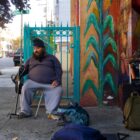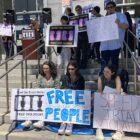Part of the community-funded City Budget Watchdog series
After a flurry of last-minute negotiations, the San Francisco Board of Supervisors narrowly approved a revised budget for the San Francisco Municipal Railway on Tuesday, ending a standoff with Mayor Gavin Newsom but not rolling back substantial service cuts and fare hikes.
Board President David Chiu, who had spearheaded an effort to reject the budget, ended up voting to table his own resolution, thereby providing the 6-5 margin that passed the spending plan. He characterized the deal as necessary given the city’s overall dire financial situation as its faces a $438 million budget deficit.
Chiu noted that if California voters reject a series of proposals designed to address the state’s budget crisis in the May 19 special election, the city could be in an even more dismal position.
"In these difficult times, we have to figure out a way to come to a resolution that we may not all feel good about," he said. "We are about to head into a budget season that is the worst budget season our city has seen in recent history."
Chiu’s concession came after Newsom had warned the board that rejecting Muni’s budget would deepen the city’s overall deficit. If a deal had not been reached by July 1, the beginning of the next fiscal year, the city would have had to put up as much as $30 million from the General Fund to maintain Muni service.
The mayor expressed pleasure at the outcome.
"I am pleased that the Board of Supervisors did the sensible thing and did not reject the Muni budget," Newsom said in a statement, praising Supervisor Carmen Chu for leading the negotiations between his office, the Municipal Transportation Agency and Chiu. "This budget allows Muni to continue to improve safety and reliability, and at the same time it prevents further cuts to other city services such as health care and public safety."
Campos ‘utterly disappointed’
But supervisors who had backed Chiu’s resolution were not satisfied with the deal.
Supervisor David Campos said he was "utterly disappointed" that the negotiations did not yield more progress on reducing the amount of money other city departments bill Muni for services like the 311 call center and the police department’s traffic company, which is tasked with the job of keeping traffic flowing citywide. The revised budget reduced the bills, dubbed "work orders," by an additional $2.8 million, to bring the total to about $63 million for the coming fiscal year. Work orders had totaled as much as $83 million when the budget was first proposed in March.
"We’re still talking about using more than $63 million of MTA money for purposes that have nothing to do with public transportation," he said. "A number of us ran to have a progressive majority that stood firm that we have the obligation to protect the people who are disadvantaged in this city. This effort falls way short of doing that."
Supervisor Ross Mirkarimi said he was concerned about the latest round of fare increases, which include upping the cash fare from $1.50 to $2.00. He was particularly bothered by MTA Executive Director Nathaniel Ford’s mention of the MTA’s plan to evaluate fares for possible increases every two years in the future. The city previously raised its cash fare from $1.25 to $1.50 in 2005.
"I do not want to get into this practice that we must continue to reconcile the Muni budget deficit on the backs of its riders," Mirkarimi said, pointing to "structural problems" within Muni’s budget.
Mirkarimi and Campos were joined by supervisors Eric Mar, Chris Daly, John Avalos in voting against approving the budget.
The revised budget calls for a delay to the proposed increase for youth, seniors and disabled monthly passes. The pass will increase from $10 to $15 on July 1 as planned, but a secondary increase to $20 will be delayed from Jan 1 until May 1, 2010. The budget also calls for lowering the monthly Lifeline pass for those on fixed incomes, from $35 to $30.
Parking meter enforcement to 8 p.m.?
In addition, the MTA will study extending parking meter enforcement from 6 p.m. to 8 p.m., with plans to implement the extension within 90 days. The MTA will also cap the number of staffers dedicated to enforcing proof of payment on Muni lines. Coupled with work order reductions, additional staff reductions and cuts in miscellaneous expenses, the MTA found a combined total of $10.3 million in additional cuts and savings in its budget.
Ford said the delay in fare increases and the reduction of the Lifeline pass, a combined total of approximately $1.785 million, would be paid for by the additional $10.3 million. The remaining $8.6 million will be re-invested into the Muni system to compensate for the service reductions, Ford said, using the Transit Effectiveness Project as a blueprint. He said Muni will increase service and frequency on lines that are parallel and complementary to lines that are being discontinued or reduced. For instance, the 7 and 71 lines could see increased frequency to account for the elimination of the 6 Parnassus line.
Chiu said he was pleased that the MTA had reached an agreement with the police department to provide more transparency to the system under which the MTA is billed for traffic services. He noted that City Controller Ben Rosenfield would be conducting an audit of work orders to ensure that Muni is getting the services it is paying for. He said he was also comforted that the additional parking enforcement would mean that the budget hardship would be shared by drivers as well as Muni riders.
"We are headed in the right direction," he said. "This meets the promise of being a transit first city."









